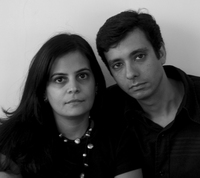Mandvi House
インド
© Photographix
What are the ideas that define SPASM?
We have a flamenco kind of approach and Ping-Pong kind of pace. Shared experiences over the years make every project we take on enjoyable. Our approach is very chaotic upfront. Our team is intrinsically involved from the get-go; several ideas are put on the table and worked through laterally. Essentially, our expression is based on the concerns we develop while understanding what the task is at hand. These concerns are then translated into a physical tangible buildable construct using our own personal intuitive logic – rational decisions based on relevance, appropriateness, technology, budgets, craftsmanship, locale, the list is too long…
SPASM is not interested in being avant-garde. Like Marcel Proust said, “To see new landscapes you don’t need to always journey, but have new eyes.” We try to be very human in our approach and not too fussy in our details. We do try to bring a poetic touch to our expression but never at the cost of appropriateness. An eastern kind of “inclusivity” is sought; every aspect of building, occupation and future ageing of projects is mulled over – many, many, many times over. Every commission is an opportunity to discover ourselves, through what we propose and build.
SPASM has designed in India and East Africa, what ‘concerns’ arise as a practice based in India?
The concerns remain the same throughout:
How honest can you be?
How sensible can you be?
How humble can you be?
What is relevant?
How long will it remain so?
Can your project go further than its apparent purpose?
How humane can it be?
Will it be endearing, through how it performs?
Concerns also change; it’s all very fluid.
What are SPASM’s ‘objectives’ – individual and professional?
SPASM is a small controlled practice. We’re interested in an intimate relationship with our studio, our team, our collaborators, our models, drawings, visualizations, products, buildings and our clients. We do this because we love it. We sense displeasure; we respect questioning and constructive criticism on all the projects. We don’t know how to run our studio any other way. The extremely personal way our studio runs gives us immense happiness. Our ultimate objective is simply happiness – a sense of doing something.
You both graduated from the Academy of Architecture and initiated the practice with a collaborative agenda – what influences your architecture?
Influences are many, from all spheres of life – from travels to our children. People who think outside the box to achieve difficult goals and challenges are inspiring. People who teach you what NOT to do through their work are also very important influences, perhaps beacons….. Both of us have many personal influences and mentors from art teachers to books we’ve read, colleagues, professors, ex-employers – too many in facts.
Practicing in developing India and continuing to produce patient qualitative architecture can be challenging. What essential ideas contribute to this quality? What is the ‘process’?
Our buildings try to be the best representations of their own reality. An architect channels all the conditions, constraints, functional issues, resources at hand, etc., into a resolute whole. That’s where the special quality comes – in an architect’s sense of light, lightness and weight of materials, workmanship, the act of putting things together….. More than ideas, we feel that it is the inner sensibility that contributes to that special feel or quality.
Process is a constantly changing animal! Sometimes it’s as easy as a stallion to ride on, and sometimes as difficult as a chameleon to nail down – it’s never the same. However, there always comes a, “this feels right” moment.
- カテゴリー
-
- 建築家
- 場所
- Mumbai, インド
- 社員
- 12
- ウェブサイト
- www.spasmdesign.in
- 設立年
- 1995
-
